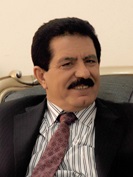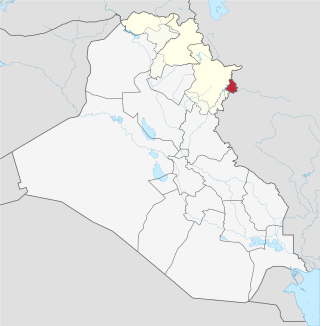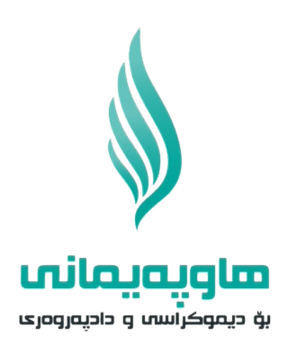
Sulaymaniyah or Slemani, is a city in the east of the Kurdistan Region of Iraq, not far from the Iran–Iraq border. It is surrounded by the Azmar (Ezmer), Goizha (Goyje) and Qaiwan (Qeywan) Mountains in the northeast, Baranan Mountain in the south and the Tasluja Hills in the west. The city has a semi-arid climate with very hot dry summers and cold wet winters.

Barham Salih is an Iraqi Kurdish politician who served as the eighth president of Iraq from 2018 to 2022.

Kurdistan Region is an autonomous administrative entity within the Republic of Iraq. It comprises four Kurdish-majority divisions of Arab-majority Iraq: the Erbil Governorate, the Sulaymaniyah Governorate, the Duhok Governorate, and Halabja Governorate. The KRI is bordered by Iran to the east, by Turkey to the north, and by Syria to the west. It does not govern all of Iraqi Kurdistan, and lays claim to the disputed territories of northern Iraq; these territories have a predominantly non-Arab population and were subject to the Ba'athist Arabization campaigns throughout the late 20th century. Though the KRI's autonomy was realized in 1992, one year after Iraq's defeat in the Gulf War, these northern territories remain contested between the Kurdistan Regional Government and the Government of Iraq to the present day. In light of the dispute, the KRI's constitution declares the city of Kirkuk as the capital of Iraqi Kurdistan. However, the KRI does not control Kirkuk, and the Kurdistan Region Parliament is based in Erbil. In 2014, when the Syria-based Islamic State began their Northern Iraq offensive and invaded the country, the Iraqi Armed Forces retreated from most of the disputed territories. The KRI's Peshmerga then entered and took control of them for the duration of the War in Iraq (2013–2017). In October 2017, following the defeat of the Islamic State, the Iraqi Armed Forces attacked the Peshmerga and reasserted control over the disputed territories.

Masoud Barzani is a Kurdish politician who has been leader of the Kurdistan Democratic Party (KDP) since 1979, and was President of the Kurdistan Region of Iraq from 2005 to 2017.

The Iraqi Kurdish Civil War was a civil war that took place between rival Kurdish factions in Iraqi Kurdistan during the mid-1990s, mostly between the Patriotic Union of Kurdistan and the Kurdistan Democratic Party. Over the course of the conflict, Kurdish factions from Iran and Turkey, as well as Iranian, Iraqi and Turkish forces, were drawn into the fighting, with additional involvement from American forces. Between 35,000 and 40,000 fighters and civilians were killed.

Kosrat Rasul Ali is a Kurdish politician and the leader of the Supreme Political Council of Patriotic Union of Kurdistan (PUK), veteran Peshmerga military leader, former Prime Minister, and former Vice President of the Kurdistan Region.

The Kurdistan List, also known as the Kurdistan Alliance or the Brotherhood List, is the name of the electoral coalition that ran in the Kurdistan Regional Government parliamentary elections in Iraqi Kurdistan in July 2009. The Kurdistan List represented a coalition of the two main ruling parties in Iraqi Kurdistan, namely the Kurdistan Democratic Party and the Patriotic Union of Kurdistan. It is the successor of the Democratic Patriotic Alliance of Kurdistan.

The Kurdistan Democratic Party, usually abbreviated as KDP or PDK, is the largest party in Iraqi Kurdistan and the senior partner in the Kurdistan Regional Government. It was founded in 1946 in Mahabad in Iranian Kurdistan. The party states that it combines "democratic values and social justice to form a system whereby everyone in Kurdistan can live on an equal basis with great emphasis given to rights of individuals and freedom of expression."

Nawshirwan Mustafa was an Iraqi Kurdish politician who served as the General Coordinator of the Movement for Change and the leader of the opposition in the Kurdistan Region from 1 April 2009 to his death on 19 May 2017.

Sardasht Osman was an Iraqi Kurdish journalist and student from Erbil who was kidnapped on 4 May 2010 outside the College of Arts Building where he studied English. On May 6, 2010, his body was found in neighbouring Mosul city. He was known in Iraqi Kurdistan for articles criticising the Kurdistan Region and Masoud Barzani. Some of his articles were published under a pseudonym on several Kurdish websites.

The Iraqi–Kurdish conflict consists of a series of wars, rebellions and disputes by the Kurds against the central authority of Iraq starting in the 20th century shortly after the defeat of the Ottoman Empire in World War I. Some put the marking point of the conflict beginning to the attempt by Mahmud Barzanji to establish an independent Kingdom of Kurdistan, while others relate to the conflict as only the post-1961 insurrection by the Barzanis. Since the US-led invasion of Iraq and the subsequent adoption of federalism and the recognition of the Kurdistan Region (KRI) as a federal entity in the new Iraqi constitution, the number and scope of armed clashes between the central government of Iraq and the Kurds have significantly decreased. In spite of that, however, there are still outstanding issues that continue to cause strife such as the disputed territories of northern Iraq and rights to export oil and gas, leading to occasional armed clashes. In September 2023, Masrour Barzani sent a letter to the President of the United States expressing concerns about a possible collapse of the Kurdistan Region following the suspension of oil exports, and calling for the United States to intervene.

The Kurdistan Region parliamentary elections of 2013 took place on 21 September 2013. It was the fourth legislative election in Kurdistan Region since 1992. The candidates were competing for a total of 111 seats out of which 11 seats were reserved for minorities. According to the Iraqi High Electoral Commission, there were 366 female and 736 male candidates for the elections. A total of 2,653,743 people were eligible to vote throughout the three provinces of Erbil, Sulaymaniyah and Dohuk of which 74% cast their ballots.

Halabja Governorate is a governorate in the autonomous region of Kurdistan Region in Iraq. The governorate was established in 2014, splitting off from Sulaymaniyah Governorate and becoming the fourth governorate in the Kurdistan Region of Iraq. Its capital is the city of Halabja. Halabja Governorate is the least populated governorate.

An independence referendum for the Kurdistan Region of Iraq was held on 25 September 2017, with preliminary results showing approximately 92.73 percent of votes cast in favour of independence. Despite reporting that the independence referendum would be non-binding, the autonomous Kurdistan Regional Government (KRG) characterised it as binding, although they claimed that an affirmative result would trigger the start of state building and negotiations with Iraq rather than an immediate declaration of independence of Kurdistan. The referendum's legality was rejected by the federal government of Iraq.

Parliamentary elections took place in Kurdistan Region on 30 September 2018 to elect Parliament. The election came a year after a failed bid for independence and left the ruling Kurdistan Democratic Party (KDP) with 45 seats, that positioning it to lead the next regional government. Announcement of the results was delayed for three weeks. The KDP's historic rival and junior coalition partner in government, the Patriotic Union of Kurdistan (PUK), was in second place with 21 seats. The results suggest that Masoud Barzani’s KDP will take a dominant position in Kurdish politics.

Sirwan Saber Barzani is an Iraqi Kurdish businessman and military commander. He is a member of the Kurdish Barzani family. He is the older brother of Saywan Barzani, an Kurdish diplomat.

The National Coalition, founded by Barham Salih under the name Coalition for Democracy and Justice is a Kurdish political party in Iraqi Kurdistan.

Jordan–Kurdistan Region relations are bilateral relations between Jordan and the Kurdistan Region. Jordan is represented in Kurdistan Region through a consulate general in Erbil since 2011, while Kurdistan Region has no representation in Jordan. Relations are described as historical, dating back to the times of Mullah Mustafa Barzani and King Hussein bin Talal. As a response to the unilateral Kurdish independence referendum in September 2017, Jordanian Foreign Minister Ayman Safadi stated that the issue was an internal Iraqi affair and that Jordan did not interfere in other countries' domestic affairs. The Jordanian Consul General in Erbil described ties as "strong and solid" in August 2018.

Rewaz Fayeq is a Kurdish politician who was elected as the Speaker of the Kurdistan Regional Parliament in July 2019. She is a member of the Patriotic Union of Kurdistan party. She is the second female to be elected Speaker of the Kurdistan Regional Parliament.

The 2020 Kurdish protests were a series of demonstrations and riots against the Kurdistan Regional Government in Sulaymaniyah Governorate in Iraqi Kurdistan. The demonstrations started on 2 December 2020. Demonstrators took to the streets to demonstrate against the political leadership, high unemployment rate, lack of public services and infeasible wages. Certain demonstrators set fire to several government buildings and the headquarters of political parties during the protests, which resulted in harsh crackdowns from PUK security forces.



















